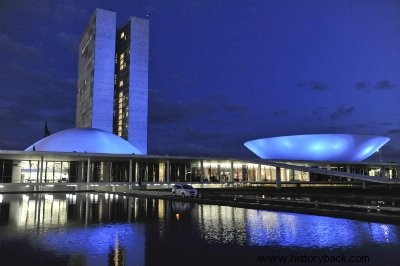The Brazilian National Congress is a political institution that represents the seat of Brazil's legislative power.
Located in Brasília, in the country's capital, its function is to exercise legislative power.
The Brazilian federal legislative power is exercised in two houses:the Senate and the Chamber of Deputies. The main activities of the congressmen of the two houses are the legislative function and the supervision of the other powers.
 The National Congress building in Brasília (DF)
The National Congress building in Brasília (DF)
Functions and Attributions
The National Congress is made up of deputies, who serve four-year terms, and senators, who can be elected for up to eight years.
There are a total of 81 senators for the 27 federative units (26 states and the Federal District). 513 federal deputies are elected by the states.
Each house elects a president. Thus, there is the president of the Chamber of Deputies and the president of the Senate. Both must obey a common regiment, which is directed by the Bureau of the National Congress. The chairmanship of the table is always the responsibility of the president of the Senate and the occupation of the other functions is carried out by the Chamber of Deputies.
The working regimes of the two houses are called legislative periods. The first period starts on February 2nd and ends on July 17th.
The second starts on August 1st and runs until December 22nd. There is the possibility of extraordinary calls if the agenda so justifies.
Topics Discussed in Congress:
- Multiannual Plan
- The Budget Guidelines Law
- The Annual Budget Law
- Provisional Measures edited by the Executive Branch
- Regulation of the tax system
- Income collection and distribution
- Fixing and modifying the strength of the Armed Forces
- Internal and External Territorial Boundaries
- Grant of amnesty
- Creation, transformation and extinction of positions, jobs and public functions
- Issuance of currency, with its limits and amount of the federal securities debt
- Authorization to the President of the Republic to declare war or peace
- Declaration of state of siege
- Authorization of Referendums
- Calls for plebiscites
As a way of guaranteeing the exercise of their functions, parliamentarians have a series of benefits. They are entitled to so-called parliamentary immunity. This measure is characterized by the impediment of precautionary arrest, preventive arrest or imprisonment for a final criminal sentence.
Parliamentary immunity guarantees privileged forum. That is, federal deputies and councilors can only be judged by the STF (Federal Supreme Court). Congressmen are also not incorporated into the Armed Forces and are not required to testify about sensitive information during their term of office.
History
The National Congress was created in 1824, following the model of bicameralism of the French monarchical Charter, drawn up after the fall of Napoleon Bonaparte.
The Imperial Constitution determined, in its article 14, the creation of a "General Assembly", which would integrate the Chamber of Deputies and the Senate.
With the end of the Monarchy and the rise of the Republic, the new Constitution of 1891 formalized the Legislative Power as an exercise of the National Congress. The composition of this model included the Chamber of Deputies and the Federal Senate.
In 1934, the new Constitution breaks with bicameralism. The break was made clear in article 22, where it was determined that the Legislative Power would be exercised by the Chamber of Deputies. The Federal Senate was left with the status of collaborator.
A new condition to Congress would come from the Constitution of 1937. Through the new Magna Carta, replacing the National Congress, a "National Parliament" would be instituted. This structural model was broken by the then president Getúlio Vargas (1882 - 1954). The form of government adopted by Getúlio was marked by the recurrent issue of decree-laws.
Only in 1946, the Brazilian legislature was once again called the "National Congress". The former physical headquarters of the National Congress is in Rio de Janeiro, the former federal capital. It is the Tiradentes Palace, which started to be used in this function in 1926.
In the 1960s, the National Congress was transferred to Brasília, the current seat of the Federal District. Brasília was designed to be the capital of the country under the architectural coordination of Oscar Niemeyer (1907 - 2012).
The architect designed an iconic building that houses the two legislative houses, the Chamber of Deputies and the Senate.
With the Military Coup of 1964, the National Congress was closed once again. Activities in the democratic period were resumed in 1988, when the current Constitution was voted on.
Curiosities
- The president of the Federal Senate is the presidential successor after the vice president. In the event of their departure, the president of the Senate takes over the work at the Palácio do Planalto, which is the seat of the federal executive power.
- On December 6, 2007, Iphan (Instituto do Patrimônio Artístico e Histórico Nacional) toppled the architectural structure of the National Congress, making it a national heritage site
See further :
- Military Coup of 1964
- Military Dictatorship in Brazil
- Direct Now
- Era Vargas
